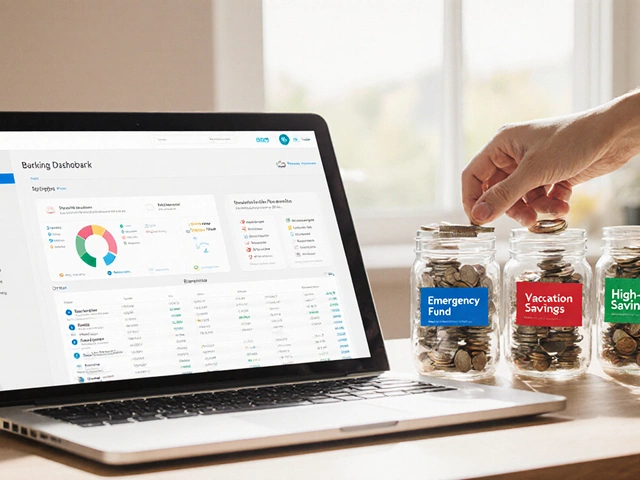Archive: 2025 / 01
Where Do Millionaires Store Their Wealth: Bank Insights
Explore how millionaires manage their wealth and learn if they concentrate their funds in a single bank. This article examines the diverse banking strategies of the affluent, revealing how they maintain financial security and optimize returns. Discover the benefits of diversifying accounts and why understanding a bank's offerings plays a critical role in wealth management. Gain insights into how these practices can apply to your financial approach.
Discovering the Easiest Bank to Get Home Loans Approved in 2025
Navigating the world of home loans in 2025 can be daunting, especially with varying criteria across banks. This article explores which banks are offering easily accessible home loans. It provides insights into approval processes, EMI calculations, and the documentation required. Homebuyers will find practical tips to increase their chances of loan approval in Australia.
Essential Guide to Earned Income Credit Disqualifiers
The Earned Income Credit (EIC) is a valuable tax benefit for many working individuals and families, offering potential relief and refunds. However, several factors can disqualify you from receiving this financial assistance. This article aims to inform you about the key disqualifiers, the impact of errors on eligibility, and important tax information for understanding and navigating EIC rules successfully.
Secure Online Payment Options in India: A Comprehensive Guide
Navigating the world of online payments in India can be daunting due to the myriad of options available. It is crucial to ensure safety while making digital transactions. This article explores the most secure online payment methods and provides tips for safeguarding financial information. Insights into popular platforms and security features make online banking both easy and reliable. Stay informed and protect your hard-earned money with the right payment choices.
Understanding Social Security Benefits After Your Spouse Passes
Losing a spouse is an emotional experience, and dealing with financial matters during this time can add to the stress. Understanding your eligibility for both your own and your late spouse's Social Security benefits is crucial. This article delves into the specifics of what happens to Social Security benefits after your spouse dies, who qualifies for survivor benefits, and how this affects your income tax situation. Tips and insights to simplify the process and maximize your benefit eligibility are included.
Maximize Returns by Investing $15,000 Monthly in SIP India
Investing $15,000 a month in a Systematic Investment Plan (SIP) in India can significantly bolster your financial portfolio. Learn how SIPs function, the potential returns, risks involved, and strategies to optimize your investment for long-term growth. Discover factors impacting the success of your SIP and valuable advice for both beginners and seasoned investors venturing into the Indian market.
How to Set Up Indian Bank Net Banking Online Effectively
This article explores the process of opening Indian Bank net banking online, offering a user-friendly guide for both novices and experienced users. Learn about the prerequisites, step-by-step registration process, and security tips to enhance your online banking experience. Gain insights into the benefits of digital banking and helpful resources available for ensuring a smooth transition to online financial management. By the end of this read, you'll be equipped with the knowledge needed to confidently navigate the online banking landscape.
Mastering Personal Finance: The 15-65-20 Rule for Savings
The 15-65-20 rule is a straightforward guideline for managing your finances effectively. It suggests allocating 15% of your income to savings, 65% for essential expenses, and 20% for discretionary spending, helping you balance living for today while planning for the future. This article delves into the specifics of this rule and offers tips to adapt it to your lifestyle. Whether you're a seasoned saver or just starting, understanding this approach can simplify financial planning. Get ready to discover practical insights that can lead to financial peace of mind.
Revealing India's Least Profitable Bank in the Online Era
Exploring the challenges faced by the least profitable bank in India, this article delves into the factors influencing its financial standing in the digital age. Readers will gain insights into how online banking trends impact profitability, discover the unique hurdles this bank encounters, and find expert tips on navigating the online banking sector. This piece highlights the shift towards digital solutions and examines how traditional banks are adapting to stay competitive.
Smart Investment Strategies for Making 50 Lakhs in 5 Years in India
Making 50 lakhs in 5 years is a realistic financial goal if planned strategically. Understand different investment avenues available in India such as mutual funds, stocks, fixed deposits, and real estate. Assess risk tolerance and diversify investments to maximize returns while reducing potential risks. Staying informed about market trends and regularly reviewing your portfolio can increase your chances of reaching this financial milestone. Implementing a disciplined savings approach paired with strategic investments can enable significant wealth accumulation.
Is Taking a Gold Loan in India a Wise Choice?
Gold loans have become an accessible and popular lending option in India. They are secured loans where borrowers pledge gold as collateral to secure funds. While they often provide quick and hassle-free access to cash, it is crucial to understand the safety aspect involved. This article delves into multiple aspects of gold loan safety, including its benefits, potential risks, interest rates, and tips on securing the best deal.
Understanding SBI's 118 Rupee Charge: A Detailed Guide
State Bank of India (SBI) often charges customers a fee of 118 rupees, which can be confusing for many. This article delves into the reasons behind this fee, the services it covers, and how customers can avoid unnecessary charges. We will explore common scenarios leading to this fee and provide tips for managing your SBI account effectively. By understanding these charges, customers can make informed decisions and optimize their banking experience.



















